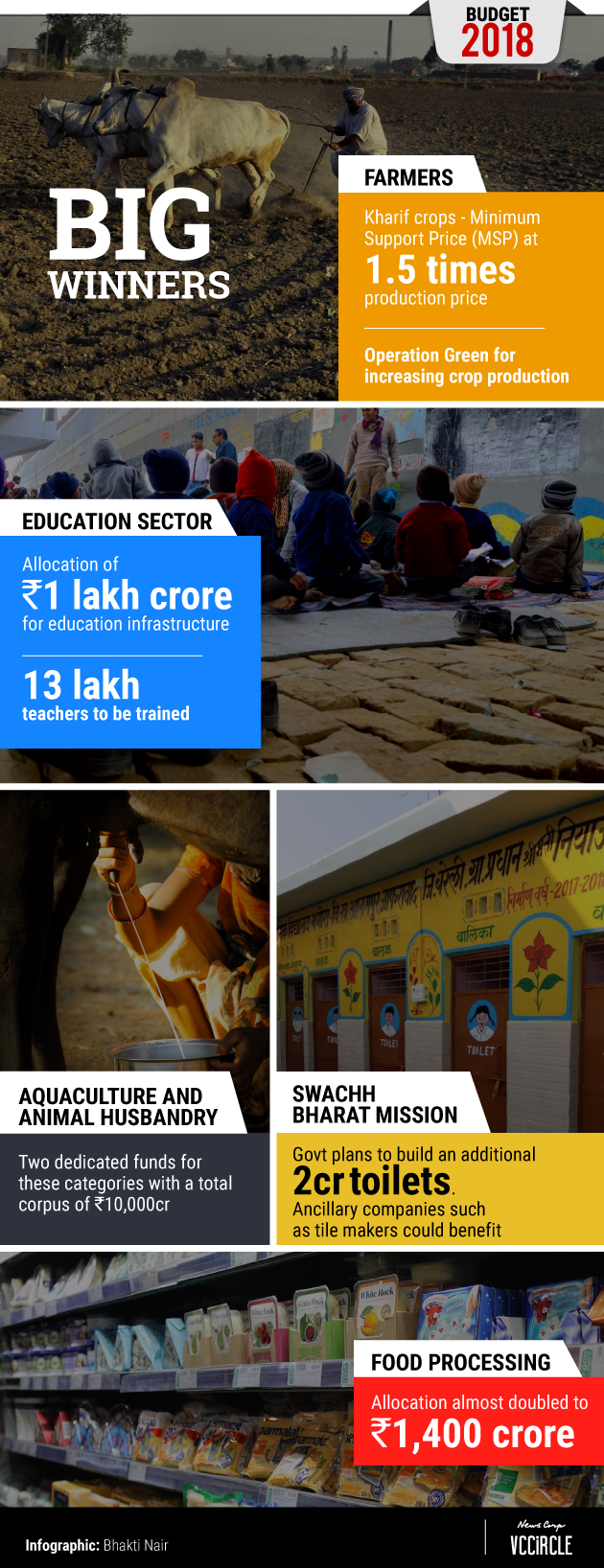Rural India and the education sector were among the big winners of the Union Budget for 2018-19 even as Finance Minister Arun Jaitley dashed the middle class' hopes of income tax relief.
Jaitley gave agriculture and rural livelihood prime-time billing in his fifth and final full Budget on Thursday, which was aimed at tackling simmering discontent over falling crop prices. The finance minister proposed an allocation of Rs 14.34 lakh crore for creating livelihood in the rural sector.
The budget also gave the education sector reason to cheer as the government pledged Rs 1 lakh crore - one of its highest allocations for the sector in recent years - in a bid to strengthen education infrastructure.
Micro, Small and Medium Enterprises (MSMEs) were given a tax sop to ensure stakeholders are left with "higher investible surplus", which the government hopes in turn will create more job opportunities. MSMEs with a turnover of up to Rs 250 crore will have now have to pay a tax of 25%.

But the middle class was left disappointed as Jaitley decided to leave the personal tax structure unchanged. However, there was some consolation as the financce minister announced a standard deduction of Rs 40,000 under the label of transport and medical allowance.
Farm push
For the farm sector, the Budget highlights included an increase in credit targets, an Operation Green for increasing crop production, and a Minimum Support Price (MSP) for crops that will be 1.5 times the cost incurred by farmers.
The government set a higher institutional credit target for agriculture for the financial year 2018-19 at Rs 11 lakh crore, up from Rs 10 lakh crore.
In addition, the government has decided to upgrade 22,000 rural haats to Gramin Agricultural Markets.
These markets will also be linked with the national agriculture market portal eNAM and exempted from Agricultural Produce Market Committee (APMC) regulations, thereby helping farmers make direct contact with potential buyers.
"The continued focus on agricultural sector reform is appreciated, especially the government's effort to integrate rural haats to the eNAM and increasing the purview of MSP for comprehensive coverage of agri commodities,” said Ajay Kakra, leader-food and agriculture at PwC India.
In an attempt to capitalise on the surplus produce of agri-commodities every year, the government promised liberalisation of the export regime in the category. Jaitley pointed out that India’s agri-exports potential is as high as $100 billion against current exports of $30 billion.
The government also doubled its allocation for the food processing sector to Rs 1,400 crore from the Rs 715 crore that was announced during the last Budget. In another big boost for the sector, the Centre also proposed setting up state-of-the art facilities in 42 mega food parks.
“This will be leg-up to agri and food processing. I’m particularly encouraged by the allocation in the food processing segment,” said Rajesh Srivastava, managing director at private equity firm Rabo Equity Advisors.
Education
The finance minister said on Thursday that his government had succeeded in sending more children to schools, but the quality of education remained a concern. With this in mind, the government will train 13 lakh teachers to tackle the dearth of school teachers in the country.
In a boost for the ed-tech sector which is still at its nascent stage, the government promised to push the digitisation of education. "We will move gradually from the blackboard to the digital board," Jaitley said.
Arun Rajamani, the spokesperson for ed-tech firm Pluralsight India, lauded this initiative.
“We have observed that technology-led learning is highly effective in closing the skills gap. It is encouraging to see that the FM has announced an initiative to digitise teaching methods in India,” he said.
The launch of 18 new schools of planning and architecture at the Indian Institutes of Technologies (IITs), research fellowships and the establishment of new 24 medical colleges are also on the radar.
Other winners
Apart from agriculture, allied sectors such as animal husbandry and fisheries have also benefited from a largely populist budget. The government has decided to set up to two funds dedicated to these two categories with a total corpus of Rs 10,000 crore.
The government also claimed that it has far constructed six crore toilets as part of its cleanliness-focused Swachh Bharat Mission and aims to build an additional two crore toilets. This announcement will come as good news to ancillary companies such as tile makers.
FMCG firms, which have been hoping for a recovery in rural demand after two tough years, hailed the budget as reflection of the government’s pro-inclusive and pro-reform agenda.
“Accelerating rural infrastructure projects will improve connectivity and thereby FMCG distribution networks,” said Vivek Gambhir, managing director of Godrej Consumer Products Ltd.






